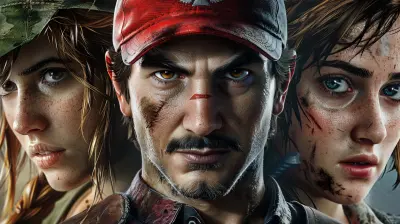How Game Awards Shape the Future of the Industry
6 June 2025
Let’s be honest: we all love a good spotlight moment. And in gaming, nothing shines brighter than those glitzy, dramatic game award ceremonies. The flashing lights, the emotional speeches, the epic trailers—game awards are more than just fancy nights filled with applause and celebrity appearances. They’ve grown into powerful platforms that help steer the direction of the entire video game industry.
Crazy, right? But stick with me, and you’ll see just how deep this goes.

The Rise of Gaming’s “Oscars”: More Than Just Trophies
You’ve probably heard about The Game Awards, right? Hosted by Geoff Keighley, these annual showcases have become gaming’s equivalent of the Oscars. But they’re not the only gig in town. There’s also the BAFTA Games Awards, the D.I.C.E. Awards, Golden Joystick Awards, and many more scattered across the globe.At first glance, they seem like simple popularity contests. But behind those glittering trophies lies something much more impactful—they’re shaping what games get made, how they’re made, and why developers make the choices they do.

Celebrating Excellence: Fuel for Creativity
Awards validate hard work. Ask any developer pouring their heart and soul into a game—they aren’t just gunning for sales. They’re chasing that elusive recognition from both the industry and the gamers who play their creations.When a game like God of War or The Last of Us Part II racks up a bunch of awards, it signals something powerful: This is what excellence looks like in gaming. And when that standard is set high, every other studio takes notice.
Here’s how that plays out:
- Inspiration for new developers: Up-and-coming devs see what’s getting recognition and set their sights on similar achievements.
- Studio morale: Nothing boosts a creative team more than recognition from their peers and players.
- Market validation: Publishers trust award-winning studios with bigger risks—and bigger budgets.

Awards as Market Catalysts
Let’s talk business, shall we?Game awards have some serious sway when it comes to sales. Think about it—how many of us immediately check out a game after it wins Game of the Year? Exactly. Awards act like a big, flashing neon sign that says, “Hey, this one’s worth your time and money.”
Here’s why that matters:
- Spike in sales: Many award-winning games see a measurable sales boost post-show.
- Extended shelf life: Games often get a second (or third) wind after award season.
- Investor attraction: Recognition breeds confidence. Investors love putting money into studios with proven success.
So yeah, while we sit couch-side watching acceptance speeches, somewhere in a boardroom, game awards are shifting financial gears.

Driving Innovation by Setting New Standards
One incredible side effect of game awards? They nudge the entire industry toward innovation. When a game wins an award for something fresh and bold, it tells other creators: “Hey, try thinking outside the box too!”Let’s break that down:
- Hades picked up awards for its art style and narrative structure—and suddenly, roguelikes started getting a lot more creative.
- Celeste won accolades for its emotional storylines, pushing indies into the spotlight.
- Disco Elysium won big for redefining RPG mechanics, showing that dialogue-heavy games could still win fans.
These aren’t just random wins—they’re blueprint-makers. Tomorrow's best games build on today's winners.
Shaping Public Opinion & Player Expectations
Think about how you personally feel after watching a game awards show. Does it make you want to try a new genre? Appreciate something you overlooked? Awards reshape how we think about games.By highlighting diversity, storytelling, accessibility, and innovation, these events open our eyes to what gaming can be. In recent years, we’ve seen categories like “Games for Impact” or awards recognizing accessibility features. These nods push players to look beyond just graphics and gameplay. Now, we also care about representation, inclusivity, and creative storytelling.
And trust me, developers are listening.
The Power of Indie Recognition
Here’s where the heart really kicks in—indie games. Game awards have become a massive stage for small studios working with limited resources and limitless imagination.When a title like Untitled Goose Game or Among Us wins big, the message is clear: You don’t need a AAA budget to create magic.
This does a couple beautiful things:
- Levels the playing field: Indies stand side-by-side with AAA titles.
- Encourages experimentation: Indies can play with weird mechanics or storytelling ideas that bigger studios avoid.
- Grows the audience: Players are more willing to try unfamiliar titles after seeing them praised.
Honestly, every time an indie wins, the whole gaming landscape shifts a little.
Awards Influence Game Roadmaps
You better believe developers and publishers are paying close attention to what wins. Award trends influence what games get greenlit.For example:
- After the massive success and awards sweep of Breath of the Wild, more open-world games leaned into freeform gameplay.
- Games like It Takes Two, which won Game of the Year, sparked interest in co-op-focused experiences.
- The rise of narrative-heavy titles like Life is Strange and Firewatch led more studios to consider story over spectacle.
These are not coincidences. Awards often serve as roadmaps for what developers chase next.
Awards Push Inclusivity and Cultural Change
Let’s not gloss over a super important aspect—game awards are pushing cultural conversations forward. Whether it's showcasing more women in games, developers of color, LGBTQ+ representation, or accessibility in gaming, game awards help shine a spotlight on topics that might otherwise stay in the shadows.In 2020, The Last of Us Part II won attention not just for gameplay but also for its bold storytelling and representation. That matters. When people feel seen in games, the industry grows stronger and more inclusive.
The Flip Side: Some Healthy Criticism
Okay, let’s be real for a sec—it isn’t all sunshine and pixelated rainbows. Some folks argue game awards can be flawed:- Popularity over merit: Sometimes the “hype machine” wins out over innovation.
- Lack of transparency: Who exactly votes? How are winners chosen?
- Underrepresentation: Indies and marginalized creators still often struggle to get the same attention.
And those concerns are valid. But like any growing medium, gaming is learning. Many award shows are taking steps to become more inclusive, transparent, and representative. It’s not perfect—but it’s progress.
Awards as Emotional Milestones for Players
Here's something you may not think about. Game awards aren’t just for devs and studios—they matter for us too. Gamers. Players. Fans.Seeing your favorite game win can feel oddly emotional, right? It’s like your passion is being validated on a global stage. It creates a sense of community. It reminds us that games are more than entertainment—they’re art, culture, and connection.
And let’s not forget the moments. Remember when Keanu Reeves showed up at The Game Awards and told us we were "breathtaking"? Instant classic.
A Glimpse Into the Future
So, what’s next? How will game awards evolve in shaping tomorrow’s industry?1. More global representation – Expect to see more love for Asian, African, and South American studios.
2. Virtual and interactive award shows – We’ve had a taste of that during pandemic times. It’s only going to grow.
3. New award categories – Think Metaverse MVPs, Best AI Integration, or Best VR Accessibility.
4. Community-driven awards – Giving power back to the players will change the dynamic drastically.
As the industry grows, so does the importance of these celebrations.
Final Thoughts: More Than Just a Gold Statue
At the end of the day, game awards are more than just glitzy ceremonies or places to drop a new trailer. They’re cultural signals. They acknowledge artistic achievement, drive technology forward, encourage inclusivity, and connect developers with players in deeply meaningful ways.They’re the north stars guiding what developers aim for and what players come to expect.
So next time you tune into a game awards show, remember—it’s not just about who wins. It’s about where we’re all headed as a community.
Because in gaming, every award won isn’t just a pat on the back—it’s a torch lighting the path ahead.
all images in this post were generated using AI tools
Category:
Game AwardsAuthor:

Lana Johnson
Discussion
rate this article
2 comments
Nadia McNeal
Game Awards? More like popularity contests on steroids! While they celebrate creativity, let’s be real: the industry’s future hinges on innovation, not just shiny trophies and influencer hype. Time to level up!
June 7, 2025 at 3:57 AM

Lana Johnson
You're right; while awards can highlight creativity, true innovation is essential for the industry's growth. Balancing recognition with a focus on groundbreaking developments is crucial for the future.
Elena Reynolds
Great insights! Game awards not only celebrate creativity but also guide trends and inspire future innovations in the industry.
June 6, 2025 at 4:03 AM

Lana Johnson
Thank you! I'm glad you found the insights valuable. Game awards indeed play a crucial role in shaping creativity and innovation in the industry.


